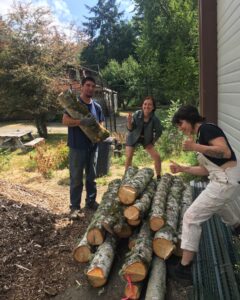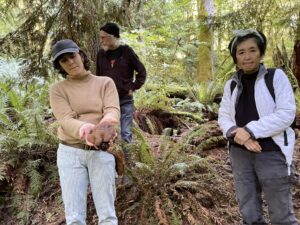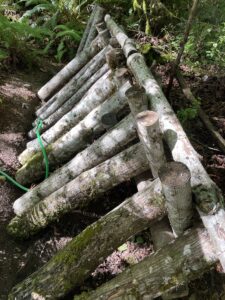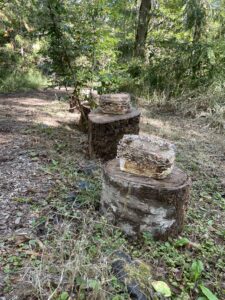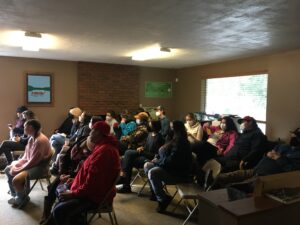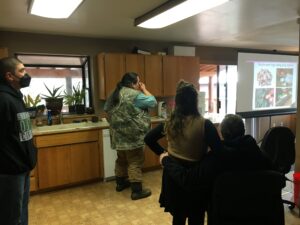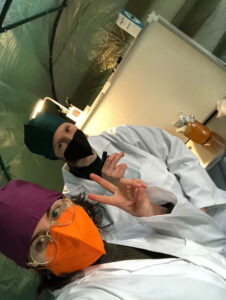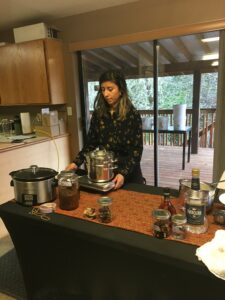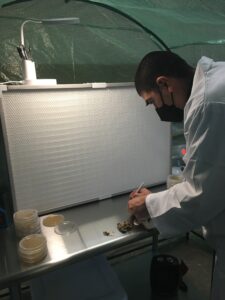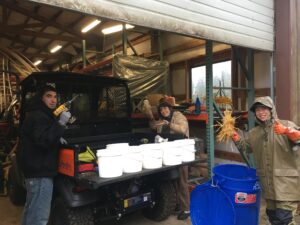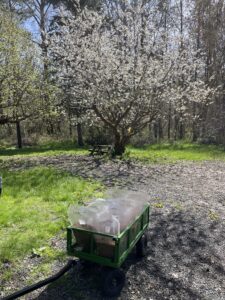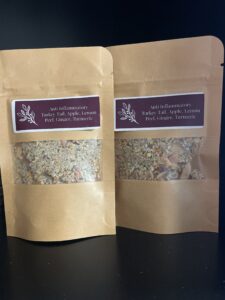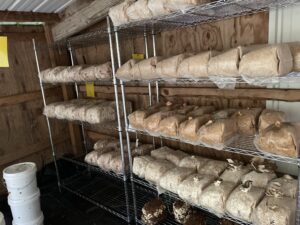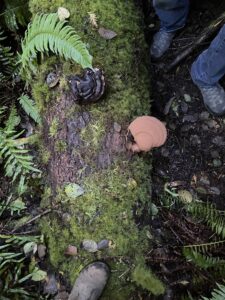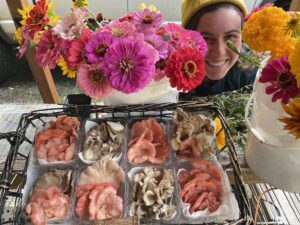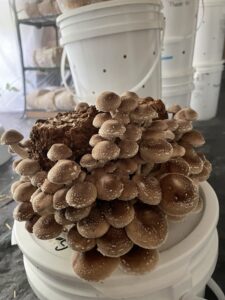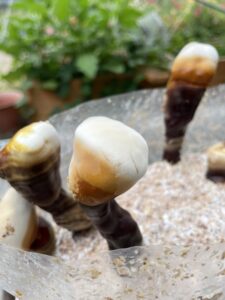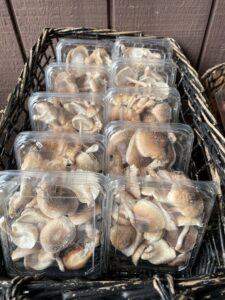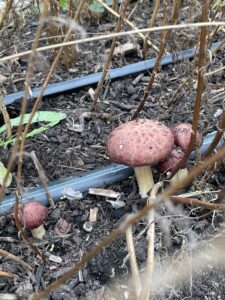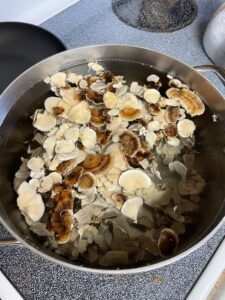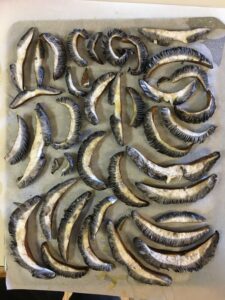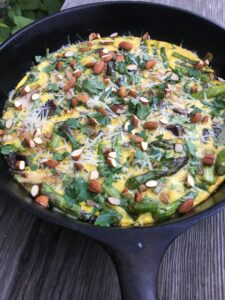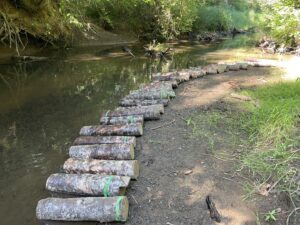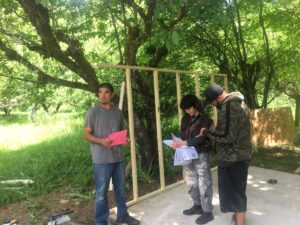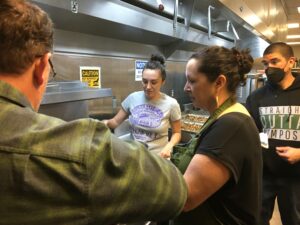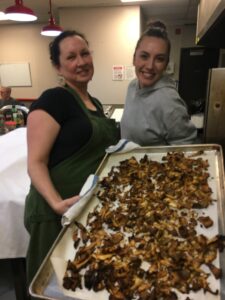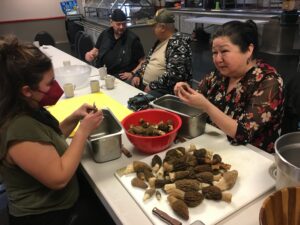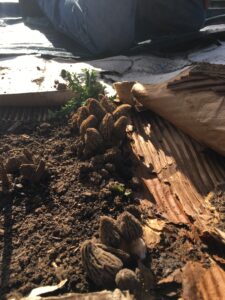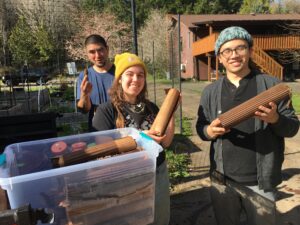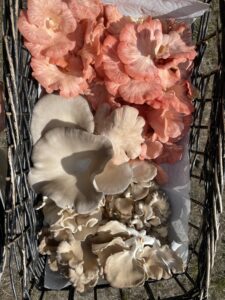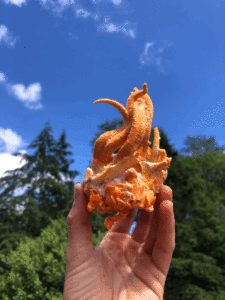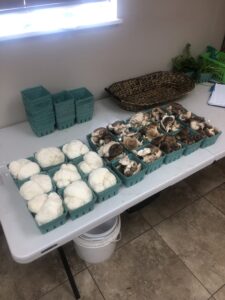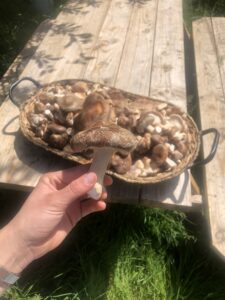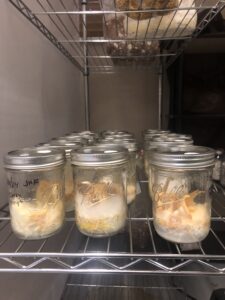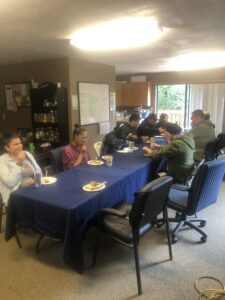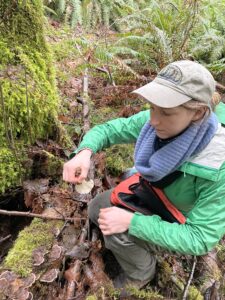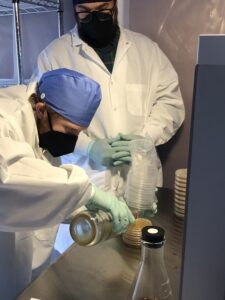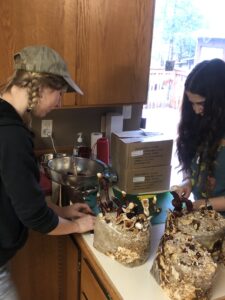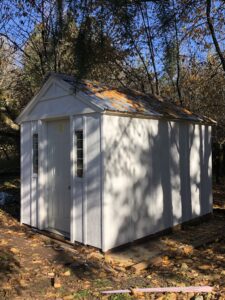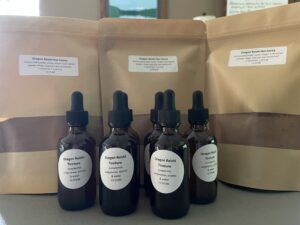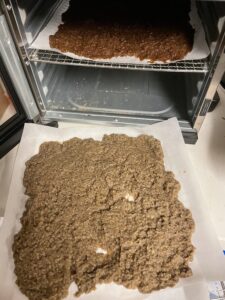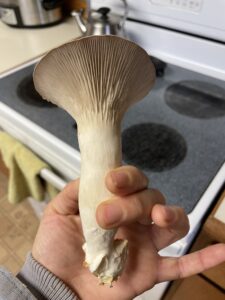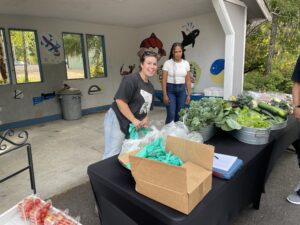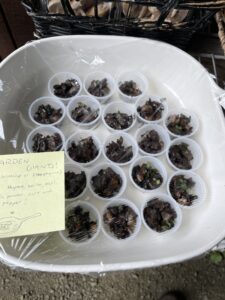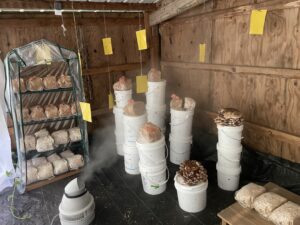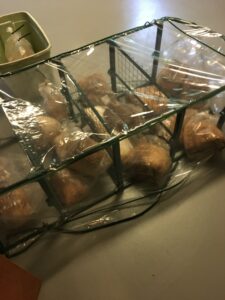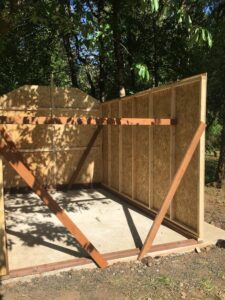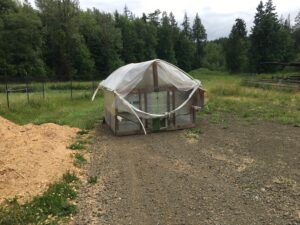Final report for WRGR23-002
Project Information
The Salish Place of Remediation Education, or SPoRE, is a community mushroom cultivation project in partnership between the Squaxin Island Tribe and Metamimicry. The SPoRE, located at and functioning as a part of the Salish Roots Farm, is helping to bring greater access to mushrooms to the Squaxin Island Tribe and broader community. At the SPoRE, people learn sustainable cultivation and experimental techniques, contribute to research projects, make medicine and recipes, grow remediator species, and grow fungi from culturally relevant, foraged finds. As a shared space, people are able to access resources, including equipment and books, for their own personal projects, increasing access to fungi for all. We aim to utilize the knowledge gained from this space, and from previous Western SARE research, to experiment with cultivation methods to include more locally produced waste substrates. Primarily, we will document this novel community approach to mushroom cultivation and produce learning materials for replicating the project, eventually sharing this knowledge with other Tribes and communities.
- Increase access to mushroom cultivation knowledge & techniques
-
-
- Host 10 workshops and events related to mushroom cultivation, foraging, preservation, cooking, medicine making, soil building, and bioremediation at the SPoRE or within the Squaxin Island Tribal community.
- Produce educational materials, including 8 videos and 7 booklets on related topics
- Orient and teach specialized training to 5 farm employees, Tribal members, and broader community to use a cultivation lab & a variety of growing techniques
- Provide farm tours to local schools, community members, and other tribes
- Create a guidebook for facilitating a community cultivation lab to be shared with other tribes and communities
-
- Increase the presence of fungi in food sovereignty efforts of tribes
-
-
- Develop sustainable systems for growing culturally relevant mushrooms on local waste substrates, such as cannabis stalks and coffee grounds
- Create extracts, broths, & tea blends with medicinal mushrooms
- Hosted an intertribal SPoRE symposium with several regional tribes to share about this project, connect local tribal mushroom programs, and offer support for other tribes starting their own programs
-
- Enhance community-based sharing of mushroom cultivation resources
-
-
- Connect the Potter Valley Tribe’s community mushroom lab with the Squaxin Island Tribe’s lab to form the first tendrils of a growing network
- Invite regional tribes to learn at the SPoRE
- Integrate the SPoRE program into other Squaxin Island Tribal departments and programs, including Natural Resources, the Education Department, Cultural Resources, the Squaxin Island Museum, and the Northwest Indian Treatment Center
-
- Improve soil health at the Salish Roots Farm
-
- Contribute an on-site source of spent mushroom blocks to an actively managed compost pile for soil building
- Utilize substrate blocks contaminated with Trichoderma sp to increase disease resistance in orchard & other garden areas
- Inoculate garden beds with mushroom spawn to build soil
Expanding on the Squaxin Island Tribe’s food sovereignty and community skill-building initiatives at the Salish Roots Farm, this project is providing essential mushroom cultivation access, education, and resources to the Tribal and greater communities. Due to socio-economic issues and environmental pollution, there is shrinking access to forageable lands and waters, creating a need for self-sufficient agricultural systems. There is a critical gap in mushroom cultivation on tribal lands, and for Indigenous communities in the Pacific Northwest, they are an essential part of traditional diets. The development of the Potter Valley Tribe’s mushroom program, led by this grant’s PI (RGR20-010), was the first of its kind to incorporate mushroom cultivation into a U.S. tribal food sovereignty project. For years, employees at the Salish Roots Farm and other Squaxin Island Tribal members have been looking to begin a mushroom program. Attempts had been made to reach out to other well-resourced local area mushroom farmers. After finding the group Metamimicry, we have worked together to construct a community-use mushroom lab and sustainable mushroom cultivation program called the Salish Place of Remediation Education (SPoRE). Using what was learned from starting the Potter Valley Tribe’s mushroom program and the Squaxin Island Tribe’s mushroom program, we have developed methodology for replicating these programs within other tribal communities. We have shared the results of this project with more than 5 other tribes, community groups, and hundreds of Squaxin Island Tribal community members and South Sound community members.
April 2023 - October 2023
Mushroom Production and Distribution
Participants: over 100 tribal members
Expected Outcomes: Enhanced healthy foods and wellbeing for tribal members (especially elders and cancer patients), documentation of methods, in-depth trainings of cultivation for tribal members
October 2023 to February 2024
Guidebook and Resource Development
Participants: 4
Expected Outcomes: Guidebook for sustainable mushroom cultivation in conjunction with food sovereignty initiatives, specialized training and instructional videos
February 2024 to April 2024
Dissemination of Resources and Presentation to 4 Other Tribes
Participants: between 200 and 1000 total participants
Expected Outcomes: Education to other tribal communities as well as individuals and groups, increased awareness of mushroom cultivation methods in conjunction with food soveriegnty
April 2023 - April 2024
Monthly Educational Workshops Held Onsite
Participants: over 200 total participants
Expected Outcomes: Increased knowledge for mushroom cultivation, between 8 and 10 booklets for the 12 workshops, community and partnership building
Cooperators
- (Educator)
- - Producer (Educator)
Education & Outreach Initiatives
1. Host 12 monthly workshops and events related to mushroom cultivation, foraging, preservation, cooking, medicine making, soil building, and bioremediation at the SPoRE
2. Produce educational materials, including 5-8 videos and 8-10 booklets on related topics
3. Orient and teach specialized training to 5 farm employees, Tribal members, and broader community to use a cultivation lab & a variety of growing techniques
4. Provide farm tours to local schools, community members, and other tribes
5. Create a guidebook for facilitating a community cultivation lab to be shared with other tribes and communities
- Hosted 10 monthly workshops and events related to mushroom cultivation, foraging, preservation, cooking, medicine making, and the health benefits of mushrooms with over 120 participants, including 25 Squaxin Island Tribal members and 15 SIT staff (non-tribal members).
- Produced 8 instructional videos for cultivating mushrooms and 8 booklets on workshop topics, linked or included in the guidebook
- Oriented and taught 5 farm employees or Tribal members, as well as 6 other community members how to use a cultivation lab and a variety of growing techniques
- Provided farm tours to local school classes and programs, as well as to children involved in the after school program at the Squaxin Island Tribe. Visiting Tribal members, staff, volunteers and other community members were frequently invited on impromptu tours. Other tribes and departments also invited for tours.
- Created a guidebook for facilitating the SPoRE program, as well as for other tribes or community groups to adopt and develop their own community access mushroom projects.
- Increased general interest and knowledge about mushrooms within the Squaxin Island Tribal community, especially regarding topics of cultivation and consumption. After receiving feedback for a stronger desire to see medicine and cooking classes, we incorporated more of these rather than bioremediation. Instead, we anticipate incorporating more bioremediation educational offerings in coming years, once the base of mushroom knowledge is more developed.
- Instructional videos were recently completed and their impact is not yet known, however, we anticipate them being extremely useful for people to follow along with written instructions included in the guidebook. Workshop booklets were distributed to all participants at workshops throughout the year, as well as distributed to guest to the Salish Roots Farm and used as promotional materials for the SPoRE program elsewhere in the community, including the Squaxin Island Museum.
- Teaching farm employees and Tribal members was less effective, as they were generally too busy and many of the cultivation techniques occur in a series across many months. However, we did offer several one-on-one trainings with interested parties when available, as well as holding several staff trainings. Other community members were trained in lab techniques through internships which helped support cultivation and processing at the farm.
- Farm tours occur regularly at the Salish Roots Farm, so incorporating in the new SPoRE program was efficient and exciting for many groups, including the after school program of the Education Department of SIT, programs of The Evergreen State College, and occasional public school classes. Volunteer days occur weekly, and volunteers were always provided with tours of the farm and introduced to the SPoRE program. Visitors are also frequent at the farm, and were usually provided farm tours and/or sent home with products of the SPoRE such as tea blends, fresh mushrooms, or booklets. Members of the Skokomish, Muckleshoot, Suquamish, and Spokane, joined us for the SPoRE symposium, which we also provided a farm tour at.
- The guidebook is now available at the SPoRE to support operation of the program. It has also been distributed to guests who attended the SPoRE symposium, including members of the aforementioned tribes, other SIT community members, and the Northwest Indian Treatment Center. We anticipate this guide being particularly useful for conceptualizing how to develop and operate a community access mushroom program as well as to support consumption of mushrooms or generating products.
1. Develop sustainable systems for growing culturally relevant mushrooms on local waste substrates, such as cannabis stalks and coffee grounds
2. Create extracts, broths, & tea blends with medicinal mushrooms
3. Travel to 4 other tribes to share about this project and offer support for starting their own
- Developed a sustainable system at an appropriate scale for growing culturally relevant mushrooms on local waste substrates, including cannabis stalks, coffee grounds, sawdust, wood chips, and logs
- Created alcohol and non-alcohol based mushroom extracts, broths, tea blends, and distributed along with associated recipes and health benefits for community member consumption
- Invited several other tribes to a SPoRE symposium event to share about this project and offer support for other tribes or community groups starting their own community access mushroom projects.
- The Salish Roots Farm is now well situated to continue to operate the small scale mushroom program to grow culturally relevant mushrooms on local waste substrates. The guidebook and associated materials support the operation of the program.
- Over 250 community members have received fresh mushrooms, mushroom tea blends, and/or medicinal mushroom extracts throughout this program. Mushroom-based teas and meals were also prepared and provided for workshops and other events. Recipes were incorporated into the guidebook and/or distributed at the produce stand so that community members could prepare meals with mushrooms they had never cooked with before. 5 cooking classes helped to introduce mushroom cooking skills and techniques into the community and provide a general increase in desire to incorporate mushrooms into meals regularly.
- Several other tribes are now connected and sharing about their own interests in developing mushroom programs. The Salish Roots Farm is now beginning to serve as a central node for knowledge sharing regarding developing mushroom programming in regional tribal programs.
1. Develop a novel library method for use & exchange of mushroom cultivation equipment and supplies
2. Connect the Potter Valley Tribe’s community mushroom lab with the Squaxin Island Tribe’s lab to form the first tendrils of a growing network
3. Invite regional tribes to learn at the SPoRE, and visit 4 other tribes to help set up new community mushroom labs
1. We did not develop a novel library method for use & exchange of mushroom cultivation equipment and supplies.
2. Connect the Potter Valley Tribe’s community mushroom lab with the Squaxin Island Tribe’s lab to form the first tendrils of a growing network
3. Invite regional tribes to learn at the SPoRE, and visit 4 other tribes to help set up new community mushroom labs
- Rather than developing a novel library method, we spent an extensive period of time focusing on getting sustainable systems up & running at the farm. This was an iterative process and will continue to be improved upon as the Salish Roots Farm takes over complete management of the SPoRE. Thus, the methods for cataloging and sharing resources will be more incorporated in with how the farm already operates.
- The Potter Valley Tribe and the Squaxin Island Tribe are now connected and able to share cultivation resources and cultures. The Muckleshoot Tribe is also developing a mushroom program and was just connected with these programs at the SPoRE symposium. In addition, the Spokane Tribe has reached out for myco-remediation consultation and resources. The Suquamish Tribe also provided a small grant to the program and was able to see some returns on this investment by coming to the SPoRE symposium. Future work will likely reveal deeper and more meaningful connections.
- Regional tribes attended the SPoRE symposium, where they shared with each other about their own interests in mushroom programming and got to learn about the SPoRE program.
1. Contribute an on-site source of spent mushroom blocks to an actively managed compost pile for soil building
2. Utilize substrate blocks contaminated with Trichoderma sp to increase disease resistance in orchard & other garden areas
1. Contributed an on-site source of spent mushroom blocks to an actively managed compost pile for soil building
2. Utilize substrate blocks contaminated with Trichoderma spp to increase disease resistance in orchard & other garden areas
- Contributed an on-site source of spent mushroom blocks the on-site compost facility at the farm, with roughly 60 lbs of material being added each month. The compost is annually incorporated into the fields for soil building.
- Surprisingly, far fewer blocks became contaminated with Trichoderma spp than we anticipated. Our overall contamination rate was quite low, but tended to be bacterial contamination in the lab or pests in the fruiting areas. This resulted in most contaminated or spent blocks being incorporated into compost.
- In addition, we planted several patches of Stropharia rugosoannulata in the fields, a gardener's companion which attracts earth worms, increases soil moisture, and combats soil pests.
Educational & Outreach Activities
Participation summary:
We facilitated workshops at the farm, several staff trainings, and intern trainings related to mushroom cultivation and usage. We also presented to a local college program, at a mushroom festival, and to a mushroom club about the SPoRE program. We also brought workshops and talks to other departments within the tribe, including the Northwest Indian Treatment Center, the Education Department, Natural Resources, Cultural Resources, and the Squaxin Island Museum. We produced several booklets associated with workshops as well as a community access mushroom project guidebook for facilitating the SPoRE program or facilitating a similar program in another tribal community. We produced instructional videos to support written instructions in the guidebook. And finally we invited regional tribes and tribal programs to join us for the SPoRE symposium to share about the program.
Learning Outcomes
Project Outcomes
The primary outcomes of this project are increased presence of fungi in food sovereignty efforts of the Squaxin Island Tribe and other tribal communities as well as increased access to mushroom cultivation knowledge & techniques. These outcomes can be seen in the actual presence of fresh and processed mushrooms grown by the Salish Roots Farm and distributed freely to community members at their weekly produce stand, as gifts to elders and volunteers, as warm beverages served at many gatherings, and as recipes taught and meals enjoyed. Regular workshops helped stirred a growing interest and awareness of fungi in the community, and community members began coming to the farm to request or ask about specific types of mushrooms grown, including reishi, turkey tail, oyster mushrooms, and more. For many workshops, we pivoted to other interests of community members based on feedback from participants and many brainstorming sessions with the program managers, and offered more of a focus on how to consume the mushrooms grown at the farm: medicinal benefits, making medicinal extracts and teas, and cooking with mushrooms. Other workshops educated people on mushroom cultivation techniques and sent participants home with their own inoculum. In addition to these community workshops, we also had farm crew trainings, local grower trainings, and interdepartmental events which increased fungal cultivation knowledge more directly within the SIT community. And finally, the guidebook, associated videos, and workshop booklets are helping to support the longterm retention of this knowledge where Metamimicry's presence will be minimized into the future. We have trained the trainers! And now these trainers are connecting with other tribal programs and are beginning the process of supporting other tribal community mushroom programs.
Our main recommendation is in line with input first received by SARE upon notification of award-- this is a big project with many facets on a short timeline and minimal funding. It took resilience, creativity, and grit to complete this project in the timeframe allotted. For future applicants, we would highly recommend a 2-year program with increased funding for this sort of undertaking. We would have benefitted from a year of building relationships and trouble shooting setting up the infrastructure before working out all the kinks in cultivation. Nonetheless, it has been a highly successful pilot program and we look forward to seeing more programs like this develop in other tribal communities.
